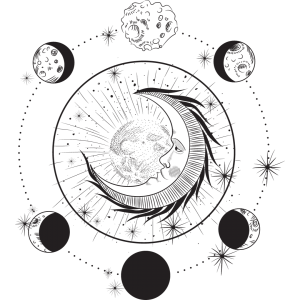When Are Transits More Powerful? Applying vs Separating Explained

When interpreting transits and aspects in astrology, one question that often arises is whether transits are more powerful when they are applying or separating. Applying aspects are those that are approaching exactitude, while separating aspects are those that have already passed exactitude.
Many astrologers believe that applying aspects are more powerful than separating aspects, because they are building up to their peak intensity. As the aspect becomes exact, its energy is at its strongest, and then it begins to wane as the planets move away from each other. However, some astrologers argue that separating aspects can also be very powerful, because they represent the aftermath of an event or situation.
The answer to the question of when transits are more powerful ultimately depends on the specific chart and the energies involved. It is important to consider the orbs of the planets involved, as well as the natal chart and any other transits that may be occurring simultaneously. Additionally, different aspects may have different strengths depending on the planets involved and the angle between them.
Key Takeaways
- Applying aspects are generally considered more powerful than separating aspects, but both can have significance in interpreting transits and events.
- The strength of a transit depends on a variety of factors, including the orbs of the planets involved and the natal chart.
- It is important to consider the specific energies and angles involved in each aspect when interpreting transits.
Understanding Applying and Separating Aspects
When it comes to astrology, applying and separating aspects play a crucial role in understanding the energies that are at play. These terms refer to the relationship between two planets, and whether they are moving closer together (applying) or further apart (separating).
The Role of Planets
The impact of applying and separating aspects depends on the planets involved. For example, if the Sun and Neptune are forming a sextile aspect, the energies will be more harmonious when the planets are applying. On the other hand, if Saturn and Mars are forming a square aspect, the energies will be more challenging when the planets are applying.
Impact of Orb
The orb is the degree of separation between two planets to form an aspect. The closer the planets are to an exact aspect, the more powerful the energies will be. However, even when the planets are not exactly aligned, the energies can still be felt within the orb range.
Significance of Natal Chart
The significance of applying and separating aspects in a natal chart is determined by the individual’s birth chart. Applying aspects are believed to be more powerful and intense, representing energies coming into being, and will be particularly influential at a particular time. The separating aspects may unfairly be said to have “already happened” – it’s all past tense, with the belief that, over time, they will exert less and less influence over us.
When interpreting transits, applying aspects are generally considered to be more powerful than separating aspects. This is because the energies are building up and approaching their peak at the exact aspect, whereas with separating aspects, the energies are waning and fading away.
Overall, understanding the role of applying and separating aspects is essential in interpreting the energies of transits and events in your life. By paying attention to the planets involved, the orb range, and your natal chart, you can gain a deeper understanding of the relationships, growth, and events in your life cycle. However, it is important to keep in mind that astrology is not a precise science and should be used as a tool for self-discovery rather than a prediction of future events.
Interpreting Transits and Aspects
When it comes to interpreting transits and aspects, there are several factors to consider. One of the most important is whether an aspect is applying or separating. In astrology, an applying aspect is one that is getting closer to being exact, while a separating aspect is one that is moving away from exactness.
The Influence of Retrograde
Another important factor to consider is whether a planet is retrograde or direct. Retrograde planets tend to bring up issues from the past, while direct planets tend to bring up new issues. When a planet is retrograde, its energy is turned inward, which can make it more difficult to express that energy outwardly.
The Power of Progressions
Another important factor to consider is progressions. Progressions are a technique used in astrology to track the movement of the planets in your birth chart over time. They can provide insight into the energies that are currently active in your life, and can help you to understand the underlying themes and patterns that are playing out.
The Impact of Life Cycle
Finally, it’s important to consider where you are in your life cycle. Each person goes through different phases of growth and development, and each phase is associated with different energies and themes. For example, the first Saturn return, which occurs around age 29, is often associated with a sense of responsibility and the need to establish oneself in the world.
By taking all of these factors into account, you can gain a deeper understanding of the energies that are currently at play in your life, and can use this knowledge to navigate challenges and make the most of opportunities. Whether you’re looking at your natal chart, interpreting transits and aspects, or exploring the impact of progressions, astrology can be a powerful tool for personal growth and self-discovery.
Frequently Asked Questions
How do you determine if an aspect is applying or separating in astrology?
In astrology, applying aspects are those that are getting closer to becoming exact, while separating aspects are moving away from exactness. To determine if an aspect is applying or separating, you need to check the degrees between the two planets involved in the aspect and compare it to the exact degree of the aspect.
What is the significance of applying aspects in astrology?
Applying aspects are considered to be more powerful than separating aspects in astrology. This is because they are moving towards exactness, which means that their influence is building up and becoming stronger. Applying aspects are especially important in progressions, as they can become exact during early childhood.
How do you interpret the power of transits in astrology?
Transits are powerful in astrology because they represent the current movements of the planets in relation to your natal chart. The power of a transit depends on several factors, including the nature of the planets involved, the type of aspect they are making, and the houses that they are transiting through.
What are the most important cycles to track in astrology?
The most important cycles to track in astrology are the cycles of the outer planets, such as Uranus, Neptune, and Pluto. These cycles last for several decades and have a significant impact on global events and cultural shifts. Additionally, the cycles of the personal planets (Mercury, Venus, and Mars) can have a strong influence on individual experiences.
What is the timing of important transits in astrology?
The timing of important transits in astrology can vary depending on the planet and the aspect involved. Some transits, such as the Saturn return, occur at specific ages in a person’s life, while others may occur more frequently or irregularly. It’s important to track the movements of the planets and be aware of upcoming transits that may affect you.
How do transits affect different areas of life in astrology?
Transits can affect different areas of life in astrology depending on the planets and houses involved. For example, a transit of Venus through the 7th house may bring romance or improve relationships, while a transit of Saturn through the 10th house may bring challenges or responsibilities in career and public life. It’s important to consider the specific context of each transit to understand its potential impact.
